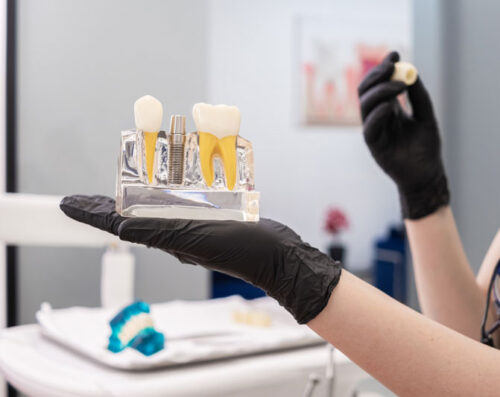Tooth Implant Recovery: What To Expect After Dental Implants
Basics of implants — strong, natural tooth restoration with a metal post.

Tooth implant recovery starts the moment your surgery ends. Recovery means your gums and bone are healing around the implant and you’re managing pain, swelling, and daily care. Healing matters because it protects the implant and lowers the chance of infection or failure. This guide sets clear expectations so you know what’s normal, what to do at home, and when to call your dentist. Follow your surgeon’s instructions closely, take medicines as directed, and give your body time to rest. Most people return to normal activities step by step over weeks to months. Use this guide to track progress and plan follow-up care.
Typical Tooth Implant Recovery Timeline
First 24 hours: immediate care
Expect mild to moderate bleeding, a blood clot forming, and throbbing pain at the site. Bite on gauze as instructed and keep your head elevated. Avoid spitting, drinking through a straw, and heavy activity. Use prescribed pain meds or OTC pain relievers as directed.
First week: swelling and pain peak, then improve
Swelling and bruising usually peak around days 2–3, then slowly improve. Apply ice for 10–20 minutes at a time for the first 48 hours, then switch to warm compresses if needed. Stick to soft foods and follow your pain medication schedule.
Weeks 2–6: soft tissue healing
Gums start to close and soften around the implant. You can move from liquids to soft foods, then to chewier items as comfort allows. Keep up gentle oral hygiene and avoid disturbing the surgical site. Most normal daily activities can resume, but avoid contact sports or heavy lifting.
3–6 months: osseointegration and final restoration
The implant fuses with the jawbone in a process called osseointegration. This takes several months depending on bone health. Once your dentist confirms good healing, a permanent crown or prosthetic is placed and you should regain normal chewing function.
Common Aftercare Symptoms and How to Manage Them
Pain, swelling, minor bleeding, and bruising are common. Manage pain with prescribed or over-the-counter meds, use cold packs early, and rinse gently with salt water after 24 hours. Numbness can occur but usually fades; persistent numbness or heavy bleeding needs urgent review. If you see increasing redness, pus, or fever, contact your dentist.
Diet and Oral Hygiene During Tooth Implant Recovery
Start with liquids, progress to soft foods (soups, yogurt, mashed potatoes), then return to regular foods as comfort allows. Avoid hot, hard, crunchy, or sticky foods near the implant for several weeks. Brush teeth gently; use a soft brush and avoid directly poking the surgical site. Saltwater rinses help keep the area clean.
Medications and Pain Control
Your dentist may prescribe antibiotics and a painkiller. Over-the-counter options like acetaminophen or ibuprofen often help. Take antibiotics as directed and complete the course. Tell your dentist about drug allergies or interactions with other medicines before taking new prescriptions.
Red Flags: When To Call Your Dentist
Contact your dentist if you have uncontrolled bleeding after several hours, severe worsening pain, spreading swelling of the face or neck, fever over 100.4°F (38°C), persistent numbness beyond a few days, or if the implant feels loose. These signs may need urgent treatment.
Tips To Support Faster, Safer Tooth Implant Recovery
Quit smoking, avoid heavy exercise for the first week, follow post-op rules, stay hydrated, eat nutritiously, get plenty of rest, and attend all follow-up visits.
What Happens at Follow-Up Visits
Dentists check healing, remove sutures if needed, take X-rays, and confirm the implant is integrating. Typical visits occur 1–2 weeks after surgery, then at intervals up to 3–6 months before final restoration.
FAQs About Tooth Implant Recovery
Q: How long until I can work? A: Most return to desk work in 1–3 days; physical jobs may need more time. Q: Can I fly? A: Yes, in most cases, but avoid long-haul travel right after surgery if you have swelling or pain. Q: When can I chew normally? A: After the final crown—often 3–6 months. Q: Will my tooth be sensitive? A: Mild sensitivity is normal and usually fades.
Free Dental Implant Consultations and Next Steps
We offer Free Dental Implant Consultations to evaluate your smile, discuss timelines, explain costs and financing, and answer questions about recovery. Schedule a consult to get a personalized plan.
Closing paragraph
Tooth implant recovery is gradual but predictable. Follow instructions, watch for warning signs, and keep follow-ups. A Free Dental Implant Consultation can give you clear next steps and peace of mind.

